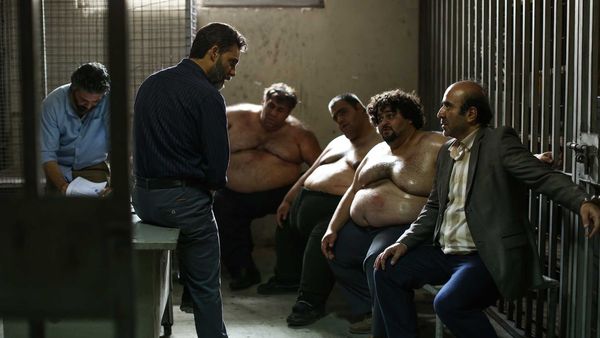Eye For Film >> Movies >> Just 6.5 (2019) Film Review
Just 6.5
Reviewed by: Anton Bitel

Just 6.5 (Metri Shesh Va Nim) is a film of crowds. You can see it in the junkyard slum that police raid near the beginning of the film, as they round up a makeshift suburb’s worth of packed-in junkies, dealers and homeless, all in an attempt to find anyone who can lead them to crack-cooking ‘mastermind’ Naser Khakzad (Navid Mohammadzadeh). You can see it in the crammed search rooms of addicts being stripped and processed who, as withdrawal kicks in, sway like zombies. You can see it in the police holding cell, already crowded when Naser is first admitted, and then truly overcrowded as yet more men, arrested and awaiting trial, fill its spaces. And you can see it in the film's final aerial image of armies of police pursuing further armies of users down a busy highway.
In fact, the film's very title also refers to crowds - the number (in millions) of addicts living in Iran - although as protagonist Samad (Payman Maadi) points out, it is a number that keeps rising. Just 6.5 may present itself as a police procedural full of cops-and-robbers thrills, as it follows the efforts of Samad's drug squad to work their way up a gang’s ramified hierarchy to the elusive Naser, and then further tracks the passage of a criminal from arrest to trial to sentence and execution - but along the way it anatomises the deleterious effects of the drugs trade on everyone who comes into contact with it, on either side of the law. All its genre elements are the neat packaging for some grim state-of-the-nation commentary, showing an aspect of Iranian society that is seldom explored on film.

Of course, the Iranian setting introduces some unexpected particularities. Here, dealers face the death penalty when caught, and police, though constantly being accused of - and investigated for - corrupt practices, are for the most part extraordinarily resistant to even the biggest bribes. It is fine to depict villainous dealers having private bars festooned with (outlawed) alcohol in their penthouses, but sexual perversion is still a cinematic taboo, even merely to mention, leading to one surreally coded scene in which Naser's ex Elham (Parinaz Izadyar) tearfully recounts how her lover used, when high on pills, to wear his shoes to bed every night - which was, bizarrely, chief amongst her reasons for leaving him.
Already rendered near mythic by his failure to be found - or even appear - until halfway through the film, Naser continues to talk up himself and his criminal reach even after he has been apprehended, but becomes an increasingly pathetic figure in custody, unable to escape the judicial procedures set in motion from the moment he was captured.
He is all at once an unrepentant destroyer of lives, and a tragic, weeping victim of his own impoverished background - and this complexity of characterisation matches the ambiguous way that writer/director Saeed Roustayi (Life+1Day, 2016) shows the wheels of justice both turning, and turning too slowly and ineffectively to save the nation from its exponentially escalating drug problem. That said, a few of the tearful interactions on display here will prove too melodramatic for some tastes.
Reviewed on: 22 Nov 2019















